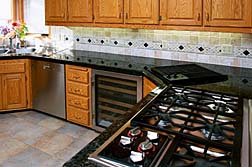Your home is an investment—for most, the single largest investment you will make in your lifetime. The installation of a granite countertop is, in itself, a huge investment. They're not cheap. You either paid a handsome sum to have it installed, or paid more for your home because it had granite already featured in what is more than likely a high-end kitchen.
 And you already know that the kitchen often drives both the cost, and the saleability of your home.
And you already know that the kitchen often drives both the cost, and the saleability of your home.So you have a granite countertop, you say. And you happen to have your home on the market?
Good luck. It will be interesting to see just how this debate impacts the sale of your home, and at the end of the day the ultimate value of your investment.
In case you've just tuned in, the talk around the kitchen counter over the past couple of weeks has been OF the kitchen counter, after various reports have surfaced linking granite countertops to radon emissions. Various tests have been conducted of granite countertops, and results appear to indicate that in a small percentage of countertops, radiation was found to be at levels higher than that considered safe.
Radon gas is the second-leading cause of lung cancer, after smoking. And yes, there are other causes of lung cancer besides smoking. That's why most Americans were so shocked at the news a few years ago that Dana Reeve, the lovely and compelling widow of actor Christopher Reeve, succumbed to lung cancer even though she hadn't smoked a day in her life.
So here's the question: did the Reeves have an imported granite countertop in their home? It is not beyond the realm of possibility, since granite is often the choice of discerning buyers who have the financial resources for such an amenity.
It should also be noted here that there are other sources for radon gas in the home besides a potentially hot granite countertop. Homes with basements, for example, are thought to emit more radon gas than homes that do not have basements—just as some areas of the country may prove 'hotter' than others.
Same goes for granite, which can hail from various corners of the world. There are literally thousands of different types to choose from, and some granites are thought to be 'hotter' than others, depending upon where it was mined.
There is no disagreement that granite serves as a source for radon. At the center of the debate, therefore, is the level of safety. The granite and marble industry has an axe to grind with those who attempt to paint their industry as a health hazard, claiming that it is nothing more than fear-mongering based on what it calls 'junk science.' And there is a fair bit of unanimity among those who have tested various granite countertops and have found that only a very, very small percentage falls into a category they would consider unsafe.
Still, there is sufficient reason for concern, according to some. New York State Health Department research scientist Michael Kitto, PhD agreed that only a small fraction of the samples he had tested, emitted radon at levels above those considered safe.
That said, a few of the samples he tested revealed levels sufficiently high to leave him feeling alarmed. Dr Kitto told WebMD that "I wouldn't have them in my house."
While the debate goes on, here's another thought—brought to the fore by David J Brenner, PhD, who serves as Director of Columbia University's Center for Radiological Research. In a statement to WebMD Brenner says this issue is not new. "The countertop story emerges every ten years or so," he said.
"This is about the third time I remember it coming around."
Okay, so why haven't we heard about this until now? And is the granite industry up front with consumers at point-of-purchase, explaining that granite is a natural product and, like any natural product could emit things the consumer may not be happy with? Is testing advocated? Is the possibility that a granite countertop could add to existing radon levels in the home, advanced?
Much like an investor chooses his, or her investment products according to risk tolerance, is a consumer's tolerance considered by sales professionals? Perhaps a granite countertop will emit radon levels well below safety limits, but would that be even too much for the consumer to bear?
READ MORE GRANITE COUNTERTOPS LEGAL NEWS
Or does all this come as a surprise to you?
If this issue does, indeed come around every ten years or so, it will likely come around again. In the meantime, it should be the responsibility of the granite industry to—and let's assume, for argument's sake, that it does—inform consumers of the risks associated with granite countertops, as low as those risks may be.
Because you don't want to live in constant fear of a health hazard. And you want to be able to sell your home, if you need to. If your granite countertop proves a liability, even if it's every decade or so, you need to know about that. Science aside, public perception is everything. And Murphy's Law will dictate that your 'For Sale' sign goes up just as the granite countertop issue hits the news again…
